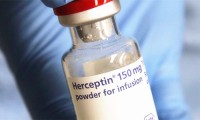-
Dune Medical’s MarginProbe destined for more than breast cancer, receives $12 million.
- Source: fiercebiotech
- 485
- July 10, 2017
-
AI Model Identifies Breast Tumor Stages Likely To Progress to Invasive Cancer
- Source: https://www.labmedica.com/pathology/articles/294801919/ai-model-identifies-breast-tumor-stages-likely-to-progress-to-invasive-cancer.html
- 69
- July 26, 2024
-
FDA Accepts New Drug Application for Shorla Oncology’s Novel Treatment for Breast, Ovarian Cancer
- Source: drugdu
- 216
- January 13, 2024
-
Modification of the Associations Between Duration of Oral Contraceptive Use and Ovarian, Endometrial, Breast, and Colorectal Cancers
- Source: Jamanetwork
- 515
- January 22, 2018
-
FDA approves first biosimilar for the treatment of certain breast and stomach cancers
- Source: mdlinx
- 628
- December 5, 2017
-
New AI Protocol Instantaneously Detects Cancer Genomic Biomarkers Directly from Tumor Biopsy Slides
- Source: drugdu
- 87
- August 7, 2024
-
Researchers reveal CAR-enhancer therapy could help overcome cancer relapse
- Source: drugdu
- 110
- August 6, 2024
-
FDA Grants Fast Track Designation to Abdera Therapeutics’ Treatment for Extensive-Stage Small Cell Lung Cancer
- Source: drugdu
- 107
- July 19, 2024
your submission has already been received.
OK
Subscribe
Please enter a valid Email address!
Submit
The most relevant industry news & insight will be sent to you every two weeks.













